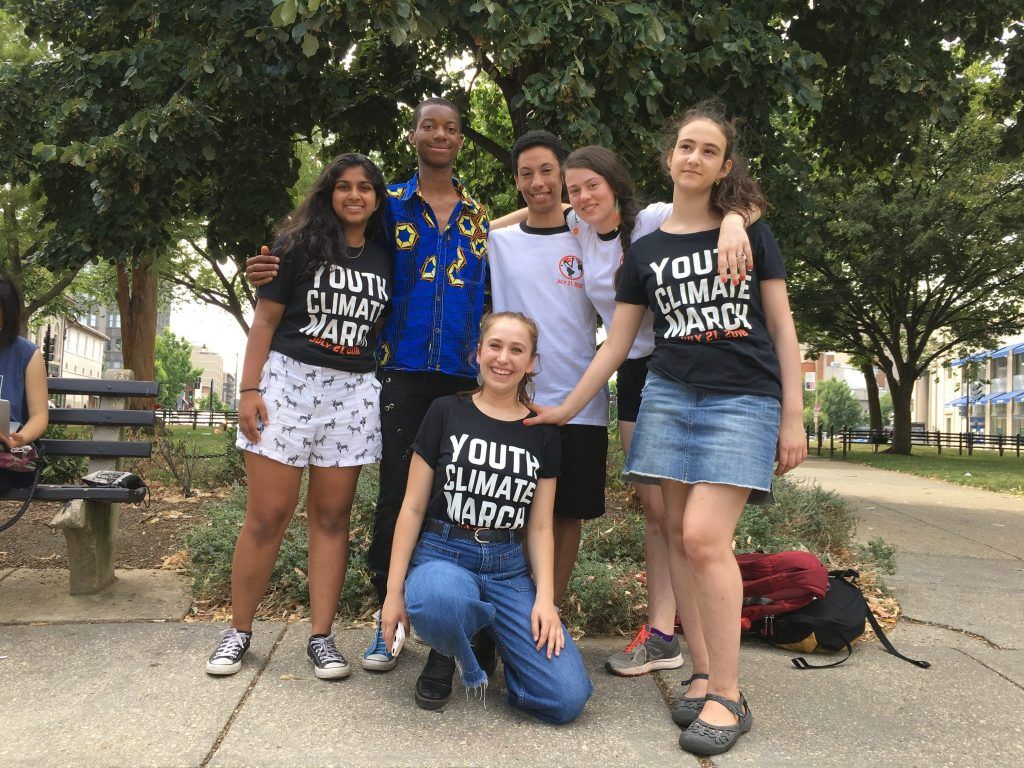Generation Z: Why we’re marching for the climate tomorrow
By Arielle Martinez Cohen | July 20, 2018
 From left to right: Zero Hour organizers Nadia Nazar, Kibiriti Majuto, Arielle Martinez Cohen, Zanagee Artis, Iris Fen Gillingham, and Jamie Margolin. Credit: Karen Martinez Cohen
From left to right: Zero Hour organizers Nadia Nazar, Kibiriti Majuto, Arielle Martinez Cohen, Zanagee Artis, Iris Fen Gillingham, and Jamie Margolin. Credit: Karen Martinez Cohen
Generation Z is not Generation Zzzzzzzz. We’re not asleep! We realize that, just as Z is the last letter in the English alphabet, the post-millennial generation is most likely the last one that will be capable of doing something to mitigate the disastrous effects of climate change. And we want our fellow citizens and elected officials to wake up.
Over the past year, teens from all over the country and abroad—including Brazil, England, Germany, Kenya, India, and the Democratic Republic of the Congo—have been joining forces to create a movement called Zero Hour. It started with Jamie Margolin, a 16-year-old from Seattle, after the United States pulled out of the Paris Agreement last year, and the movement is growing.
Zero Hour’s first big campaign kicked off yesterday, with a lobby day on Capitol Hill in Washington. Today the group is sponsoring an art event. The finale of the three-day gathering will be a march and rally on the National Mall tomorrow.
One goal of the movement is to get elected officials to pledge not to take contributions from oil companies and instead to prioritize the health of the general public and the planet. Another goal is to bring the voices of today’s youth into the conversation about climate and environmental justice. I spoke with some of the young people who have come together to organize this movement. Here’s what they had to say about their hopes for tomorrow’s march:
Iris Fen Gillingham, a 17-year-old environmental activist from New York, serves on the National Youth Council of the Earth Guardians, an organization that focuses on empowering young people as leaders. At Zero Hour, she co-leads an effort to form partnerships with other organizations. Iris hopes that, after the march, “our leaders stand up and take action, that this march will help highlight youth voices and start a conversation around climate change. Once the march is over, the youth will still be here and we won’t stop. Our future depends on it.”
Zanagee Artis, an 18-year-old environmental activist from Connecticut, is the logistics leader for the Zero Hour team. “After the march, I hope that our government pledges to shift the economy away from fossil fuels and towards sustainable energy…. However, right now that’s unlikely to happen…. In the meantime, I hope that the people that attend our march are inspired by the drive and commitment that Zero Hour youth and youth from around the country are showing in the fight to save the future of our planet. I hope that these people then return to their communities and continue our work by educating their neighbors and friends and making change in their own communities to better the environment.”
Nadia Nazar is a 16-year-old environmental activist and artist from Maryland. She created the artwork and graphics for Zero Hour. “I hope that politicians and businesspeople recognize the significance of the climate crisis,” she says, “and that they will help bring change.”
Kibiriti Majuto is a 20-year-old environmentalist and racial-justice activist from Virginia. He is also a member of the Earth Guardians National Youth Council and leads the group responsible for developing Zero Hour’s platform. “I have always believed that activism is in my blood,” he says. “I cannot sit idly by while the threats of injustice are still out there.”
I am inspired by all of the teens who are stepping up to create a livable future for our generation and generations to come. I will be attending the march to perform some original songs. I hope that my music will help fuel the work of those who are already part of the movement and will inspire others to join. I also hope that, in the near future, climate education will become a staple of our educational system; the United States will rejoin the Paris Agreement; and people all over the world will end our dependence on fossil fuels and make renewable energy our main source of energy.
Together, we make the world safer.
The Bulletin elevates expert voices above the noise. But as an independent nonprofit organization, our operations depend on the support of readers like you. Help us continue to deliver quality journalism that holds leaders accountable. Your support of our work at any level is important. In return, we promise our coverage will be understandable, influential, vigilant, solution-oriented, and fair-minded. Together we can make a difference.
Keywords: Earth Guardians, Zero Hour, climate change, climate march
Topics: Climate Change, Voices of Tomorrow















